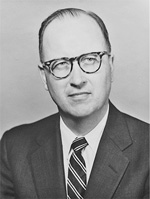
George Ernest Foster Pickard was born in Ontario and graduated with distinction from the University of Saskatchewan in agricultural engineering. He joined the department as an associate professor in 1949 and remained until his death in October
1960. He became a professor in 1951 and was the first head of the power and machinery division. During this period, he taught advanced courses in farm power and machinery design, was advisor to a number of students earning master's degrees, while carrying on an active research program.
He earned a master's degree in agricultural engineering at Iowa State University in 1935 while on leave from Massey-Harris. In 1937 he transferred to a Massey-Harris factory in France, where he be came chief engineer. Pickard and his family were interned in France by the German army throughout World War II. During that time, he studied independently and later passed the examination for membership in the Institute of Mechanical Engineers in London.
Pickard came to the University of Illinois staff from the Massey-Harris Company, where he had become assistant chief engineer of the Toronto plant. In Illinois, he served on numerous committees in the department and College of Engineering and was chair designate of the engineering policy and development committee. He supported a more liberal curriculum for engineering students at a time when cultural and humanistic subjects were not readily accepted.
In his major interest, harvesting machinery, he was a pioneer in the development of a corn head for combines. That project developed into the large-scale harvesting of corn with a combine. In 1956-57, he spent six-months on a sabbatical leave in Hawaii, where he worked on the mechanization of sugar cane production. His reviews and applications of ideas that had previously failed due to insufficient technology are well known.